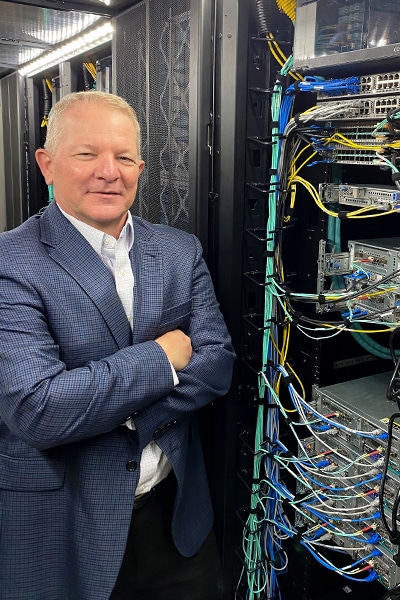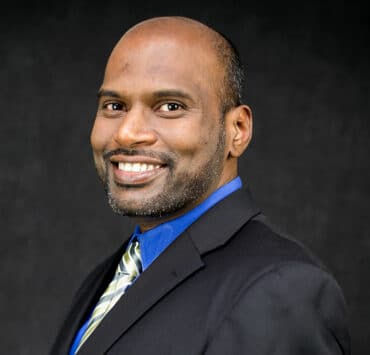When you think of IT, you generally think of big-picture issues, such as compliance, data backup, and cybersecurity. But ask Bernie Rice, senior vice president and chief information officer at Nemours Children’s Health, what he finds the most meaningful about his job, and he will tell you it’s the little things.

For example, most adults might take a hospital room TV for granted. But to a child, Rice says, a working TV can be very important. “For children in pain or who are nervous about being in the hospital, it’s a distraction technique,” he says. “In addition, thanks to a TV interface we created, a child can change the color of the lights in their room. That may seem like a simple thing, but it helps the child feel they are in control.”
Even more gratifying, Rice adds, is that through his department, older children who are long-stay patients have been able to participate in virtual graduations.
Nemours, a nonprofit organization, is one of the largest integrated pediatric health systems in the country, with two freestanding children’s hospitals. It cares for more than 480,000 children annually at more than 95 locations in 4 states.
Rice has been at Nemours for twenty-two years. In his current role, he manages all of the organization’s IT systems as well as information security and physical security for the company’s corporate enterprise. He and his team are responsible for the IT needs of its eight-thousand employees.
“In the military, you think about leadership having to deal with difficult situations. People tell me all the time how cool I am under pressure. It’s just part of that training.”
“We’re unique in the pediatric world,” Rice says of Nemours. “A lot of people are familiar with different things about the company depending on where they are, whether it’s a small clinic in a Gulf Coast fishing village or the Nemours Children’s Hospital, Delaware, our largest location.”
Rice joined the company in 1999 and worked his way up to CIO, the role that he assumed in 2008.
He came to Nemours from Anheuser-Busch, where he started as an intern and became IT manager for one of the company’s eleven breweries in his hometown of Jacksonville, Florida. “It was a nice seven years I spent there,” he reflects. “We spent hundreds of millions of dollars in modernization in the plant. But I was in my thirties with two kids—one eight and the other four—and I wanted to spend more time with my family. I saw this job for an EMR administrator for a local kids’ organization and I thought, ‘I can do that.’ It blossomed from there.”
Rice grew up in a blue-collar family and became the first of his four siblings to finish college and get a degree. He joined the Air Force out of high school, and he credits the military for helping him realize his determination to attend college.
The military, he believes, breeds better employees and employers. “The military really is a melting pot,” he says. “People come from different backgrounds and ethnicities, but you do learn to function as one unit. You develop a great camaraderie. The military also instills a sense of structure and process.”
“When I first came here, healthcare was well behind the times when it came to technology. . . . We are closer to the patients that we have ever been. Our technology is right at their bedside.”
Now, Rice leads a team of roughly four hundred people. At the risk of cliché, he says with a laugh, working with his team is what he likes most about his job. “Over the years, we’ve grown into a phenomenal IT team that really delivers,” he says. “A lot of people, like me, were hired at the start of the EMR project, and a lot of them are still here.”
The military also prepared him to become a leader. “In the military, you think about leadership having to deal with difficult situations,” Rice says. “People tell me all the time how cool I am under pressure. It’s just part of that training.”
To compliment that leadership style, Rice trusts and relies on his team. “I manage according to competencies,” he says. “Some need a little less guidance while others need some more. I’m a believer in ‘There’s a reason I hired you; now go do it.’ I depend on their expertise and give them the freedom to manage their areas. I tell people all the time, ‘Your career is in your hands. I give you opportunity, you’re the one who takes advantage or not. It’s up to them to make a difference. It’s the same thing I tell my kids.”
IT has evolved exponentially since Rice became the CIO in 2008. Currently, he and his team are working on moving Nemours’ systems to the cloud. “When I first came here, healthcare was well behind the times when it came to technology. In my early days here, someone would deliver printed reports to the different departments on a cart. Now, we’re a very advanced hospital system. We are closer to the patients that we have ever been. Our technology is right at their bedside.”
After more than two decades, observing the impact of his department’s work gives him the greatest satisfaction of all. “It’s not about helping a company make money, or getting a product out the door,” Rice says. “It’s really helping shape people’s lives. In pediatrics, there’s a saying: ‘We’re not saving lives, we’re saving lifetimes.’”


